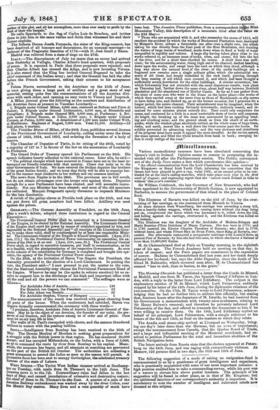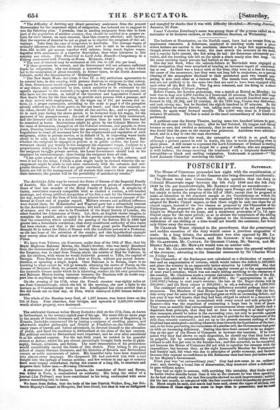The following suggestion of a mode of raising an emigration - fund
is communicated to us by a gentleman of great intelligence and experience, who is practically acquainted with some of our most important colonies: high position enabled him to take a commanding survey, while his post WSS of a nature to elevate him above partial interests. The principle of his suggestion wabe found in other plans, as in that of Mr. Kingston; but the additional"sanction of our correspondent's authority is important. It is satisfactory to note the number of intelligent and cultivated minds now directed to this subject. -a The difficulty of deriving any direct pecuniary assistance from the present Government for the important object of emigration, has induced me to suggest to you the following plan. I premise, that in sending emigrants from this to form part of the population of another country, they should be entitled to a greater return for their labour, on such removal, than this country afforded; and farther, that the expense of removal be not so great as to deprive the emigrant of this advantage. Take then the case of emigration to Australia. The average wages of ordinary labourers (for whom the demand jest now is said to be excessive) is from 251. to 301. per annum together with rations; being much higher wages, together with sustenance of a superior description, than what labourers in this country can obtain. (See Memorial to Lord John Russell—Competency in a Colone contrasted with Poverty at Home. Richards, 184&)
"The cost of removal may be estimated at 101. 10s. to 121. 10s. per head. "If these premises be correct, and the Government will not advance sufficient funds for emigration, why not attempt a somewhat similar plan to that which led to the emigration of great numbers, in former times, to the North American Colonies, under the denomination of Redemptioners:
"The New South Wales Act (stat. 9 Geo. IV. c. 83) authorizes agreements to be entered into, in this country, with persons desirous to emigrate to that colony. g them, Government would empower the agent for New South Wales, by himself, or any others duly authorized by him, (such authority to be evidenced by the agent's signature to the contract,) to agree with those desirous to emigrate, but who have not the means, on behalf of the Governor and Legislative Council of New South Wales for the time being, to provide such persons with a passage, and on their arrival with employment, at the wages say of 251. per annum and rations, (i. e. proper sustenance, according to the scale in page 6 of the pamphlet already referred to,) fur three years, on the one hand; and that the emigrant, on the other, should bind himself to render all due service, &c., and to permit, say 51. in each year during the above period, to be deducted from his wages, for the payment of his passage-money; the cost of removal would be fully reimbursed, and the labourer still be in a much better position than he could have been had he remained at home. Instructions might be given by the Colonial Minister for the issue of debentures, charged on all the Colonial revenues, and payable in three years, (bearing interest,) to discharge the passage-money; and also for the Local Legislature to enact all necessary laws for the employment and regulation of such emigrants, either in private service, or in default of it, in improving waste lands about to be sold, (and thus increasing their value,) or in public works. But whether the emigrant he engaged in private or in public service, the Local Government should pay weekly to the emigrant his stipulated wages, (subject to a proportionate deduction for the repayment of his passage-money,) and in case of the emigrant beindin private services, the Local Government should look to his employer for reimbursement; thus freeing the emigrant from all risk. "I am quite aware of the objections that may be made to this scheme; and were it not for the delay, 1 think a plan might easily be devised whereby the arrangement might be made to rest more exclusively with the colonists and emigrants themselves; for of this I am quite convinced, that the more entirely colonists are left to the management of all matters that concern their more immediate interests, the greater will be the probability of satisfactory results."



























 Previous page
Previous page